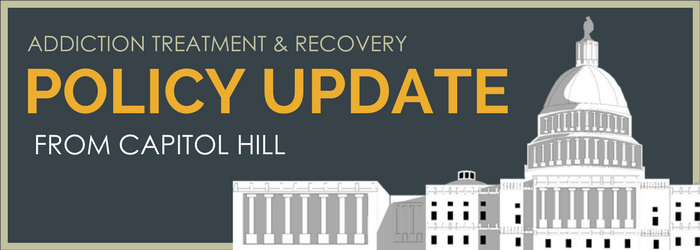
February 22, 2018 |
National Addiction Policy Update February 2018

WASHINGTON D.C. UPDATE
Spending Deal
On February 7th, Senate Majority Leader McConnell (R-KY) and Senate Minority Leader Schumer (D-NY) announced they had reached an agreement on a package to raise the budgetary caps imposed by the Budget Control Act (BCA). The House and Senate passed the package, which also includes a Continuing Resolution (CR) to keep the federal government funded through March 23rd, and various health program reauthorizations, on February 9th.
As part of the agreement to raise the budget caps, the leaders agreed to an additional $6 billion over 2 years (Fiscal Year 2018 and Fiscal Year 2019) in funding to address the opioid misuse and overdose epidemic.
While Congressional appropriators will have the authority to allocate these dollars and will have wide latitude in how the dollars are spent, per the attached summary released by the Leader’s office, the intent is that the funds be used:
To combat the substance abuse epidemic, including enhanced state grants (with additional assistance for those states with the highest mortality rates and tribes), public prevention programs, and law enforcement activities related to substance abuse and mental health programs
Appropriators will be preparing an omnibus spending package that reflects this agreement on the budget caps by March 23rd when the latest CR expires.
CARA 2.0
As soon as later this month House and Senate Committees are expected to begin considering new authorizing legislation to address the opioid misuse and overdose epidemic; the package is being referred to as “CARA 2.0” in a nod to the Comprehensive Addiction and Recovery Act (CARA), which was enacted in 2016. The House Energy and Commerce Committee has announced they will begin legislative hearings the last week in February and the Senate Health, Education, Labor and Pensions (HELP) Committee may consider legislation as early as March.
This Policy Update was generously provided by Holly Strain & Carol McDaid of Capitol Decisions, bringing you the latest national addiction policy updates from Capitol Hill.

